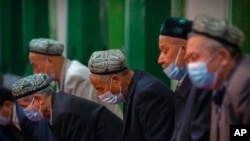Western nations and human rights groups Wednesday called on China to allow the U.N. human rights chief unobstructed access to the Xinjiang region to investigate the situation of ethnic Uyghur Muslims and other Turkic Muslim minorities.
“We are here … to ask China to allow immediate, meaningful and unfettered access to the U.N. high commissioner for human rights and her office,” said Britain’s U.N. Ambassador Barbara Woodward, whose government is one of the 18 nations that co-sponsored the virtual meeting. “To prevent her access asks the question: why?”
The high commissioner, Michelle Bachelet, has been pressing Beijing to allow her to visit Xinjiang for some time. In late February, the Chinese government said it had invited her, but no visit has materialized.
Bachelet and other human rights experts want to investigate firsthand the situation of the Uyghurs and other Turkic Muslim minorities in the autonomous province in northwest China.
“In Xinjiang, people are being tortured; women are being forcibly sterilized,” U.S. Ambassador Linda Thomas-Greenfield said Wednesday. “There are incredible reports, and credible reports, that many Uyghur people and other ethnic and religious minorities – who only wish to practice basic freedoms of religion, belief, expression and movement – are being forced to work until they drop, manufacturing clothes and goods at the behest of the state.”
Sanctions, trade restrictions
The United States has described the treatment of the Uyghur population as genocide. Washington imposed sanctions on several Beijing officials in March, and the European Union followed suit. The U.S. also has restricted trade with Xinjiang and sanctioned some Chinese companies accused of using Uyghurs for forced labor.
On Wednesday in Washington, the U.S. also expressed concern about the treatment of the Uyghurs during the release of its annual report on international religious freedom.
China's suppression against #Uighurs "just shocks the conscience," said @StateDept's senior official on international religious freedom affairs Daniel Nadel. We are ensuring people "understand the full scope and scale of the atrocities being committed there." @VOANews pic.twitter.com/EEsrlSMYnu
— VOA Nike Ching 张蓉湘 (@rongxiang) May 12, 2021
For years, Beijing has come under strong international criticism from the West and many Muslims for its treatment of Uyghurs. Human rights groups accuse China of sending more than a million Uyghurs to detention camps. China says the compounds are "vocational education centers" intended to stop the spread of religious extremism and terrorist attacks.
China had urged U.N. member states not to attend the meeting and called for it to be canceled, saying it was politically motivated and denying there is any problem in Xinjiang. But in a turnaround, one of its diplomats did end up speaking briefly at the session, declaring it was “time for truth.”
“So-called genocide, forced labor, systemic rape and torture in Xinjiang are lies of the century, which never happened and will never happen in China,” said Counsellor Jiakun Guo, head of human rights at China’s U.N. mission.
He said Beijing opposes any kind of investigation “based on lies and with the presumption of guilt” and that efforts to use Xinjiang to “contain China” were “doomed to fail.”
Personal toll
Jewher Ilham, a Uyghur activist and member of the diaspora, said her father Tohti’s arrest in 2014 has been difficult on her family. An intellectual and scholar, he was detained and given a life sentence for what Ilham says was encouraging dialogue between ethnic Han Chinese and Uyghurs. The family has had no news about his condition in four years, and they do not even know if he is still alive.
"If the treatment of an internationally known scholar like my father is already this cruel, I wonder how cruel the situation and conditions are for the other Uyghurs who don’t have family relatives that are able to speak up for them overseas,” she said.
Ilham said her community constantly lives in fear, particularly of pervasive government surveillance. She described speaking on the phone with her relatives in Xinjiang and their panic when she used traditional Muslim greetings of “peace be upon you” and “Allah wishes you peace.” She said they replied, “Xi Jinping wishes you peace,” referring to China’s president.
“This is the amount of pressure they are living in. People no longer feel safe to greet you in our cultural or Islamic traditional greetings anymore,” Ilham said. “This is how much surveillance people are under.”
International pressure
"China goes to great lengths, it seems, to cover up what is happening in Xinjiang,” said Amnesty International’s new secretary-general, Agnès Callamard.
She said that despite Beijing’s “bully boy tactics,” support for a multilateral response to the situation is growing, and she called for a transparent U.N. investigation – either by going to Xinjiang or working remotely.
“Silence, heads in the sand and unseemly concessions embolden China, tarnish the human rights system, weaken the U.N. overall and betrays our duty to the people of China,” she added.
Human Rights Watch Executive Director Kenneth Roth urged states to press for a resolution at the U.N. Human Rights Council in Geneva.
“Crimes against humanity deserve a commission of inquiry to collect the evidence and to build the case for prosecution,” he said. “At minimum, we should press for a resolution of condemnation.”
He noted that the international community united to defend Rohingya Muslims persecuted in Myanmar in 2017, and it should do the same for Uyghurs.
“Yes, the persecutor is much more powerful, but rights should not vary according to the violator,” Roth said.




